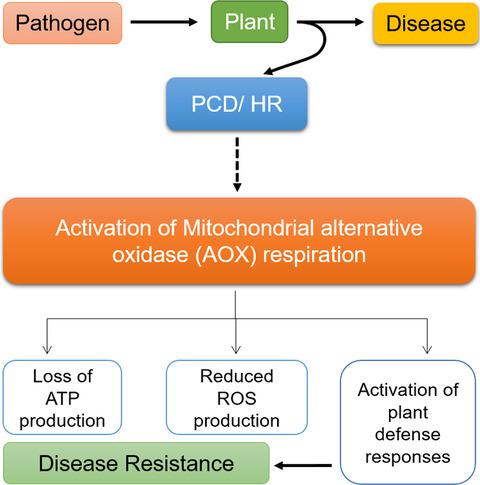当前位置:
X-MOL 学术
›
Plant Biol.
›
论文详情
Our official English website, www.x-mol.net, welcomes your feedback! (Note: you will need to create a separate account there.)
The role of alternative oxidase in plant hypersensitive response
Plant Biology ( IF 3.9 ) Pub Date : 2021-01-21 , DOI: 10.1111/plb.13237 M. Suleman 1 , M. Ma 1 , G. Ge 1 , D. Hua 1 , H. Li 1
Plant Biology ( IF 3.9 ) Pub Date : 2021-01-21 , DOI: 10.1111/plb.13237 M. Suleman 1 , M. Ma 1 , G. Ge 1 , D. Hua 1 , H. Li 1
Affiliation

|
The innate immune system of plants is crucial in defining the fate of a plant cell during plant–pathogen interactions. This response is often accompanied by a hypersensitive reaction leading to the death of a plant cell and restricted pathogen growth. Plant mitochondria, in this case, play a key role by maintaining a balance between cell respiration and reactive oxygen species formation. One of the key features of the hypersensitive response is the shift of the normal plant respiratory pathway to a special ‘alternative’ pathway. Plants contain an enzyme, alternative oxidase, for maintaining metabolic homeostasis of the cell. This energy dissipating respiration provides a branch in normal respiration by using ubiquinone to form water and heat, thus maintaining the energy status of the cell. Alternative oxidase is thought to minimize production of reactive oxygen species and can also function in ‘anti‐apoptotic’ machinery in plant cells. In this mini review, we briefly describe the alternative respiratory pathway and explain the role of alternative oxidase in important cellular processes, such as programmed cell death and the hypersensitive response.
中文翻译:

替代氧化酶在植物超敏反应中的作用
植物的先天免疫系统对于确定植物与病原体相互作用期间植物细胞的命运至关重要。该反应通常伴有超敏反应,导致植物细胞死亡和病原体生长受限。在这种情况下,植物线粒体通过在细胞呼吸和活性氧形成之间保持平衡而发挥关键作用。过敏反应的关键特征之一是正常植物的呼吸途径向特殊的“替代”途径转变。植物含有一种酶,一种可替代的氧化酶,用于维持细胞的代谢稳态。通过使用泛醌形成水和热量,这种耗能的呼吸作用为正常呼吸提供了一个分支,从而维持了细胞的能量状态。替代氧化酶被认为可以最大程度地减少活性氧的产生,并且还可以在植物细胞的“抗凋亡”机制中发挥作用。在这个小型综述中,我们简要描述了替代呼吸途径,并解释了替代氧化酶在重要细胞过程中的作用,例如程序性细胞死亡和超敏反应。
更新日期:2021-01-21
中文翻译:

替代氧化酶在植物超敏反应中的作用
植物的先天免疫系统对于确定植物与病原体相互作用期间植物细胞的命运至关重要。该反应通常伴有超敏反应,导致植物细胞死亡和病原体生长受限。在这种情况下,植物线粒体通过在细胞呼吸和活性氧形成之间保持平衡而发挥关键作用。过敏反应的关键特征之一是正常植物的呼吸途径向特殊的“替代”途径转变。植物含有一种酶,一种可替代的氧化酶,用于维持细胞的代谢稳态。通过使用泛醌形成水和热量,这种耗能的呼吸作用为正常呼吸提供了一个分支,从而维持了细胞的能量状态。替代氧化酶被认为可以最大程度地减少活性氧的产生,并且还可以在植物细胞的“抗凋亡”机制中发挥作用。在这个小型综述中,我们简要描述了替代呼吸途径,并解释了替代氧化酶在重要细胞过程中的作用,例如程序性细胞死亡和超敏反应。


























 京公网安备 11010802027423号
京公网安备 11010802027423号